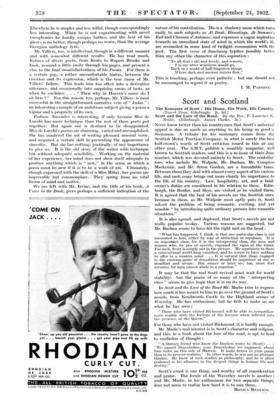Scott and Scotland
Scott and the Lure Of the Road. By the Rev. P. Laurence K.
Mudie. (Edinburgh. James Clarke. 5s.) -r
Noxv. know better than his countrymen that Scott's universal appeal is due as much as anything to his being so good a Scotsman. A tribute for his centenary comes from the Scottish Motor Traction Company, in what is surely the best
half-crown's worth of Scott criticism issued in this or any other year. The S.M.T. publish a monthly magazine, well
known to Scottish readers, and this is .a re-issue of their June number, which was devoted entirely to Scott. The contribu- tors, who include Mr. Walpole, Mr. Buchan, Mr. Compton Mackenzie, and Mr. Seton Gordon, are a formidable team. Between them they deal with almost every aspect of his various life, and each essay brings out more clearly his importance to the life of his country. Law, hospitality, art, and a land- owner's duties are considered in his relation to them. Edin- burgh, the Border, and Skye, are visited as he visited them.
It is agreed that the best of his novels are the Scottish ones, because. in them, as Mr. Walpole most aptly puts it, Scott solved the problem of being romantic, exciting, and yet sensible " by introducing quite ordinary persons into romantic
situations:"
It is also agreed, and deplored, that Scott's novels are not really popular to-day. Various reasons are. suggested, but
Mr. Buchan seems to have hit the right nail on the head :
" What has happened, I think, is that .one particular class is not interested in him, either by way of attraction or repulsion. It is an important class, for it is the interpreting class,, the men and women who, by pen or speech, expound the signs of the times. For such, Scott is simply not in the picture. He represents to thorn a conventional world long vanished, and he seems to have nothing to offer- to a modern mind . : . It is natural that those engaged in the exciting game of demolition should be impatient of one so steadfast and secure. But sooner or later we, too, must find security, for man cannot abide in a negation."
It may be that the real Scott revival must wait for world stability: . but the .praise of so many of the " interpreting class " seems to give hope that it is on its way.
In Scott and the Lure of the Road Mr. Mudie tries to express how much it has meant to him to go over the ground of Scott's
novels, from Kenilworth Castle to the Highland scenes of Wavericy. . He has enthusiasm, but he fails to make us see what he has seen :
" Those who have visited Richmond will be able to sympathize more readily with the feelings of the heroine when ushered into the presence of the Queen."
For those whci have not visited Richmond, it is hardly enough. Mr Mudies real interest is in Scott's character and religion,
and this, in a book about the lure of the road, is apt to lead to confusion of thought :
" A literary friend who knew the Borders wrote to (Scott) .
' We passed Branxholme, your Branxholme we supposed, about four miles on this side of Hawick. It looks better in your poem than in its present realities.' In other words, he was not an abstract thinker. Ho knew of such studies as philosophy,. and he is often profound in his allusions to the .deepest• things in human life and destiny."
Scott's creed is one thing, and worthy of all consideration
and praise. The locale of the Waverley novels is another : and Mr. Mudie, in his enthusiasm for- two separate -things; does not seem to realize how hard-it- is to mix them; -
MONICA






























 Previous page
Previous page